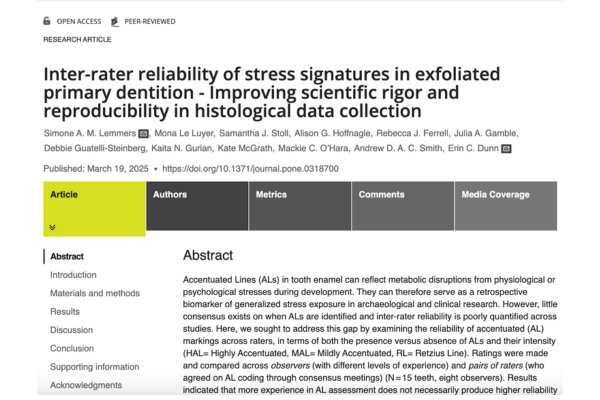New Article in PLOS One!

We are pleased to highlight a new article published by members of our department in PLOS One!
"Inter-rater reliability of stress signatures in exfoliated primary dentition - Improving scientific rigor and reproducibility in histological data collection"
Co-authored by faculty member Dr. Guatelli-Steinberg and PhD candidate Kaita Gurian, the article's abstract is as follows:
"Accentuated Lines (ALs) in tooth enamel can reflect metabolic disruptions from physiological or psychological stresses during development. They can therefore serve as a retrospective biomarker of generalized stress exposure in archaeological and clinical research. However, little consensus exists on when ALs are identified and inter-rater reliability is poorly quantified across studies. Here, we sought to address this gap by examining the reliability of accentuated (AL) markings across raters, in terms of both the presence versus absence of ALs and their intensity (HAL= Highly Accentuated, MAL= Mildly Accentuated, RL= Retzius Line). Ratings were made and compared across observers (with different levels of experience) and pairs of raters (who agreed on AL coding through consensus meetings) (N = 15 teeth, eight observers). Results indicated that more experience in AL assessment does not necessarily produce higher reliability between raters. Most disagreements in intensity ratings occurred in categories other than HAL. Furthermore, when AL assessment was performed by pairs of raters, reliability was significantly higher than individual assessments (Gwet’s AC1 = 0.28 to 0.56 for line presence assessment; Gwet’s AC1 = 0.48 to 0.64 for line intensity assessment). Based on these results, we recommend a workflow called IRRISS (Improving Reliability and Reporting In Scoring of Stress-markers) to increase rigor and reproducibility in histological analysis of dental collections. The introduction of IRRISS is well-timed, given the surge in studies of teeth occurring across anthropological, epidemiological, medical, forensic, and climate research fields."
Congratulations on the article Dr. Guatelli-Steinberg and Kaita!
The full article is available via open access at PLOS One.
Image: PLOS One
